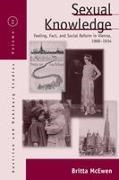Partager
Fr. 54.50
Britta Mcewen
Sexual Knowledge - Feeling, Fact, and Social Reform in Vienna, 1900-1934
Anglais · Livre de poche
Expédition généralement dans un délai de 2 à 3 semaines (titre imprimé sur commande)
Description
Vienna's unique intellectual, political, and religious traditions had a powerful impact on the transformation of sexual knowledge in the early twentieth century. Whereas turn-of-the-century sexology, as practiced in Vienna as a medical science, sought to classify and heal individuals, during the interwar years, sexual knowledge was employed by a variety of actors to heal the social body: the truncated, diseased, and impoverished population of the newly created Republic of Austria. Based on rich source material, this book charts cultural changes that are hallmarks of the modern era, such as the rise of the companionate marriage, the role of expert advice in intimate matters, and the body as a source of pleasure and anxiety. These changes are evidence of a dramatic shift in attitudes from a form of scientific inquiry largely practiced by medical specialists to a social reform movement led by and intended for a wider audience that included workers, women, and children.
Table des matières
Acknowledgements
Introduction: Vienna as Laboratory for Sexual Knowledge
Chapter 1. City Hall and Sexual Hygiene in Red Vienna
Chapter 2. Sexual education debates in Late Imperial and Republican Vienna
Chapter 3. Popular Sexual Knowledge for and about Women
Chapter 4. Clinic Culture
Chapter 5. Emotional Responses: Hugo Bettauer's Vienna Weeklies
Chapter 6. Local Reform on an International Stage: The World League for Sexual Reform in Vienna
Conclusion: Sexual Knowledge between Science and Social Reform
Bibliography
A propos de l'auteur
Britta McEwen teaches European History at Creighton University in Omaha, Nebraska.
Résumé
Vienna’s unique intellectual, political, and religious traditions had a powerful impact on the transformation of sexual knowledge in the early twentieth century. Whereas turn-of-the-century sexology, as practiced in Vienna as a medical science, sought to classify and heal individuals, during the interwar years, sexual knowledge was employed by a variety of actors to heal the social body: the truncated, diseased, and impoverished population of the newly created Republic of Austria. Based on rich source material, this book charts cultural changes that are hallmarks of the modern era, such as the rise of the companionate marriage, the role of expert advice in intimate matters, and the body as a source of pleasure and anxiety. These changes are evidence of a dramatic shift in attitudes from a form of scientific inquiry largely practiced by medical specialists to a social reform movement led by and intended for a wider audience that included workers, women, and children.
Texte suppl.
"In [this book] Britta McEwen has produced an interesting and useful work of scholarship that not only deals with a previously neglected topic, but, in so doing, also expands the still under-researched field of interwar Austria."�����American Historical Review
"McEwen has based her excellent and lively written book, which covers a broad range of issues related to the shaping of sexual knowledge in Austria, on a close investigation of a wide range of sources. McEwen's book should become a standard reference for anybody interested in the history of sexuality in the German-speaking world during the first third of the twentieth century." � German Studies Review
"McEwen's study adds to the burgeoning scholarship on Austrian sexuality that deserves to be integrated into, and has a significant contribution to make to, the interdisciplinary, comparative work done in the fields of sexuality and media studies."� �� Austrian History Yearbook
"...this study constitutes a stimulating and extensively researched voyage through the polyphonic discourses concerning the role of sexual knowledge in Viennese society during periods of social upheaval and transformation...Apart from being epistemologically refreshing, McEwen's focus on the emotional dimension yields a powerful testament to the democratizing impulses of sexual knowledge in interwar Vienna. Compelling and rich, McEwen's study foregrounds unjustly obscured actors in Austrian cultural history, and in so doing offers an original contribution to European sexuality studies."� �� German Quarterly Review
"This is a very well-researched and informative book, which will be helpful to researchers and students in the field of Austrian cultural history...conceptually and methodologically sophisticated."� �� Steven Beller, author of A Concise History of Austria
"...represents an important addition to the burgeoning literature on how progressive states defined sexuality in scientific terms... It contains a wealth of research and information not yet systematically analyzed [and offers] a valuable contribution to the history of sexuality, which is still neglected in the context of Continental Europe."� �� Carolyn Dean, Brown University
Détails du produit
| Auteurs | Britta Mcewen |
| Edition | BERGHAHN BOOKS, INC |
| Langues | Anglais |
| Format d'édition | Livre de poche |
| Sortie | 01.11.2015 |
| EAN | 9781785330377 |
| ISBN | 978-1-78533-037-7 |
| Pages | 240 |
| Thèmes |
Austrian and Habsburg Studies Austrian and Habsburg Studies |
| Catégorie |
Sciences humaines, art, musique
> Histoire
> Histoire par région/pays
|
Commentaires des clients
Aucune analyse n'a été rédigée sur cet article pour le moment. Sois le premier à donner ton avis et aide les autres utilisateurs à prendre leur décision d'achat.
Écris un commentaire
Super ou nul ? Donne ton propre avis.

